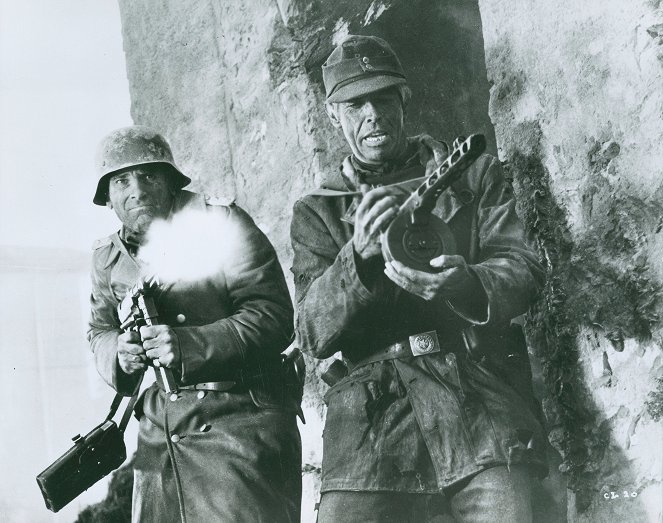Directed by:
Sam PeckinpahCinematography:
John CoquillonComposer:
Ernest GoldCast:
James Coburn, Maximilian Schell, James Mason, David Warner, Klaus Löwitsch, Vadim Glowna, Roger Fritz, Fred Stillkrauth, Véronique Vendell, Senta Berger (more)VOD (1)
Plots(1)
In 1943, in the Russian front, the decorated leader Rolf Steiner is promoted to Sergeant after another successful mission. Meanwhile the upper-class and arrogant Prussian Captain Hauptmann Stransky is assigned as the new commander of his squad. After a bloody battle of Steiner's squad against the Russian troops led by the brave Lieutenant Meyer that dies in the combat, the coward Stransky claims that he led his squad against the Russian and requests to be awarded with the Iron of Cross to satisfy his personal ambition together with his aristocratic family. Stransky gives the names of Steiner and of the homosexual Lieutenant Triebig as witnesses of his accomplishment, but Steiner, who has problems with the chain of command in the army and with the arrogance of Stransky, refuses to participate in the fraud. When Colonel Brandt gives the order to leave the position in the front, Stransky does not retransmit the order to Steiner's squad, and they are left alone surrounded by the enemy and having to fight to survive. (official distributor synopsis)
(more)Reviews (1)
As an adventure film, Cross of Iron works quite well, with James Coburn oozing a great deal of personal charisma, the German uniform suits him, and his unit consists of several other interesting characters whose fates the viewer follows with suspense. The setting of the story on the Eastern Front during a time when American historiography, in the spirit of the Cold War, downplayed the Soviet contribution to the defeat of the Axis and only tangentially mentioned the former wartime ally in the media or artistic environment, is also interesting. As an anti-war film, Peckinpah's project is no longer so unequivocal, as its main hero is too complexly written and his behavior often contradicts his statements. Without war, this cunning warrior would be nothing, so his anti-war rhetoric is hypocritical. Additionally, the artistic means by which the director aims to support his vision, such as short flashbacks or hallucinogenic scenes, bothered me quite a bit. Finally, as a film set in a specific environment and attempting to appear realistic, Cross of Iron fails completely. It is a typical script construct of someone writing from a distant country and decades later, without being able to empathize with the circumstances and mindset of the heroes. The film contains dozens of nonsensical elements that could be endlessly discussed. For example, Steiner berates his commander and his deputy in one scene, when in so-called democratic armies, he would have ended up in a facility mentioned by the British film The Hill for the same actions during times of success, and against the wall during times of failure. Totalitarian armies, whether Japanese, German, or Soviet, dealt with such men much more effectively. The mortality rate in penal units was fascinating, and someone like Solzhenitsyn could tell you what he got his stay in the gulag for. Some dialogues, and most notably the colonel's speech to his captain, reek of pathos. Many other motives also don't hold up, for example, when Steiner captures a Soviet boy. It is not an act of mercy as the creators may have imagined, but a truly malicious death sentence. The Soviets regularly shot similar returnees... Overall impression: 60%.
()

